Daily Vocabulary Words: List of Daily Used Words in Leading International Newspapers
Hi there. Welcome to this special section @ Wordpandit.
Our endeavour here is very simple: to highlight important daily vocabulary words, which you would come across in leading newspapers in the country. We have included the following newspapers in our selection:
• The New York Times
• The Washington Post
• Scientific American
• BBC
• The Guardian
• Psychology Today
• Wall Street Journal
• The Economist
We are putting in extensive work for developing your vocabulary. All you have got to do is be regular with this section and check out this post on a daily basis. This is your repository of words that are commonly used and essentially, we are posting a list of daily used words. Hence, this has significant practical application as it teaches you words that are used commonly in leading publications mentioned above.
Visit the website daily to learn words from leading international newspapers.
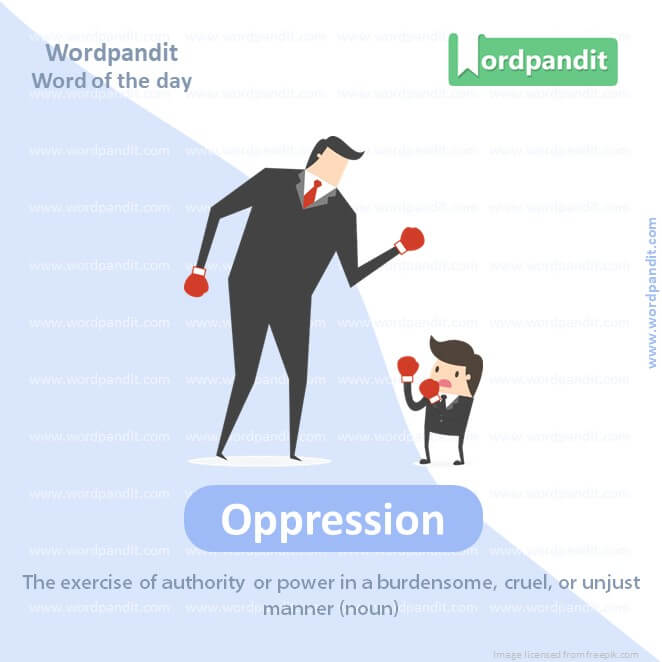
WORD-1: Oppression
CONTEXT: A system of oppression based on genocide and colonialism that aims to displace a population of a nation (oftentimes indigenous people) and replace it with a new settler population.
SOURCE: New York Times
EXPLANATORY PARAGRAPH: Imagine someone making all the rules in a game and not letting you play the way you want, no matter how much it upsets you. That feeling of being treated unfairly and not being able to do anything about it is called “oppression.” It’s when people in charge are very unfair to others just because they can be.
MEANING: The exercise of authority or power in a burdensome, cruel, or unjust manner (noun).
PRONUNCIATION: uh-PRESH-un
SYNONYMS: Suppression, Tyranny, Persecution, Subjugation, Domination
USAGE EXAMPLES:
1. Many people have fought against oppression throughout history.
2. The oppression of minority groups was a serious issue in the country.
3. She spoke out against the oppression and injustice she witnessed.
4. The regime was known for its oppression of free speech.
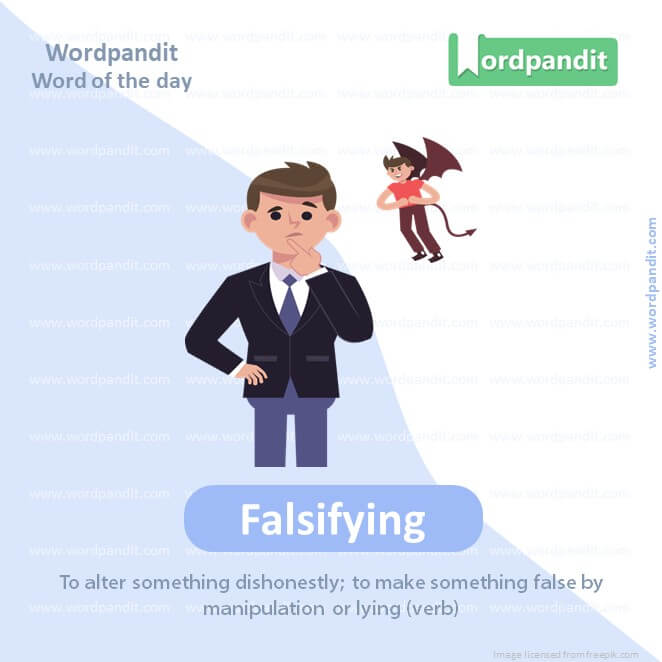
WORD-2: Falsifying
CONTEXT: YouGov found that 45 percent of respondents were either unaware of or uncertain that Trump had “been charged with falsifying business records to conceal hush money payments to Stormy Daniels, a porn star” and that Trump “had been found liable for sexually assaulting and defaming writer E. Jean Carroll.”
SOURCE: New York Times
EXPLANATORY PARAGRAPH: Imagine you’re drawing a picture but then tell everyone it’s a photo instead of a drawing. That’s like “falsifying.” It means you’re changing something to make it untrue or making up something that didn’t happen.
MEANING: To alter something dishonestly; to make something false by manipulation or lying (verb).
PRONUNCIATION: fawl-suh-fahy-ing
SYNONYMS: Fabricating, Distorting, Misrepresenting, Forging, Counterfeiting
USAGE EXAMPLES:
1. Falsifying documents is a serious crime.
2. The scientist was accused of falsifying data in her research.
3. Falsifying evidence can undermine the justice system.
4. He admitted to falsifying his resume to get the job.
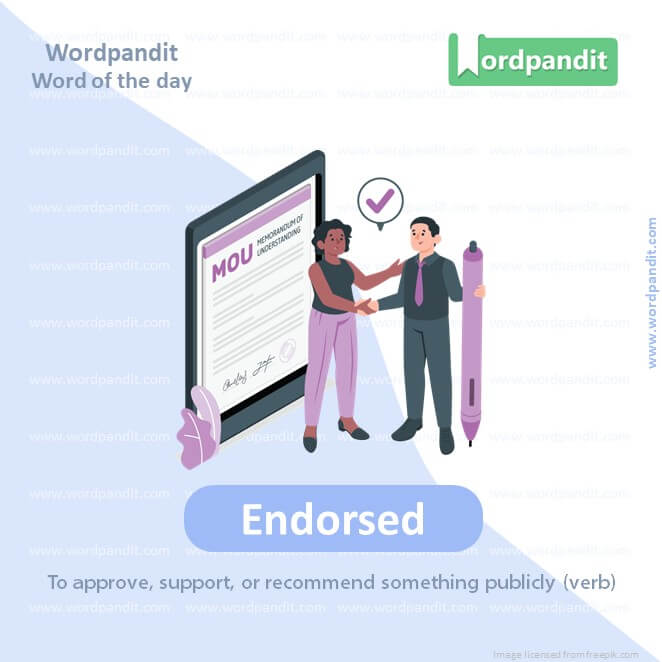
WORD-3: Endorsed
CONTEXT: Many of the provisions of the act have been endorsed by conservative Republicans in the past, but the bipartisan measure is opposed by Trump and House Speaker Mike Johnson, on explicitly political grounds.
SOURCE: New York Times
EXPLANATORY PARAGRAPH: Imagine your favorite superhero saying they love a certain kind of snack. That’s like them “endorsing” the snack, which means they’re telling everyone that they think it’s really good and people should try it.
MEANING: To approve, support, or recommend something publicly (verb).
PRONUNCIATION: en-dorst
SYNONYMS: Supported, Approved, Sanctioned, Recommended, Advocated
USAGE EXAMPLES:
1. The product was endorsed by a famous athlete.
2. The policy was endorsed by the government.
3. She endorsed the book at the launch event.
4. The proposal was officially endorsed by the committee.
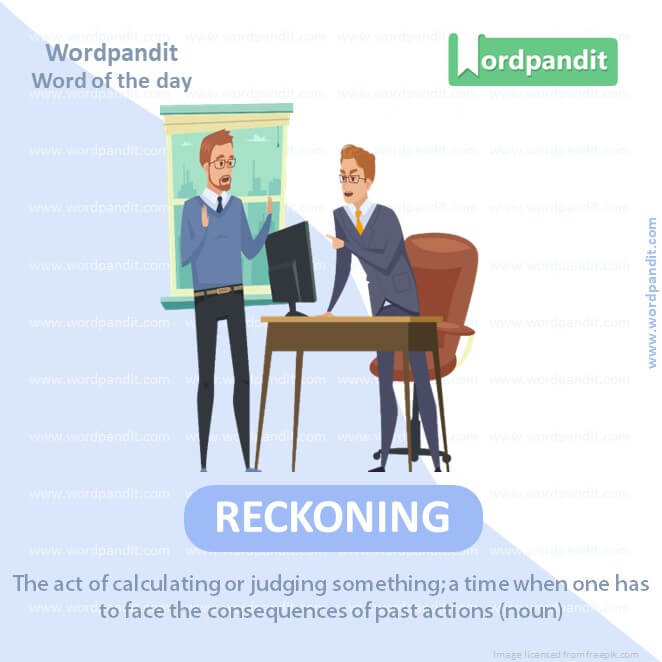
WORD-4: Reckoning
CONTEXT: a Biden Doctrine could become the biggest strategic realignment in the region since the 1979 Camp David treaty,” what amounts to “a strategy that could force a reckoning inside Iranian politics, inside Palestinian politics and inside Israeli politics” — not to mention inside American politics.
SOURCE: New York Times
EXPLANATORY PARAGRAPH: Imagine if, after playing a game, you sit down to figure out who won by counting up all the points. That’s a bit like “reckoning.” It means thinking about or calculating something, often considering the results or consequences of actions.
MEANING: The act of calculating or judging something; a time when one has to face the consequences of past actions (noun).
PRONUNCIATION: rek-uh-ning
SYNONYMS: Calculation, Judgment, Assessment, Appraisal, Evaluation
USAGE EXAMPLES:
1. The financial reckoning showed we were in debt.
2. There will be a day of reckoning for his mistakes.
3. The historical reckoning of the event was quite complex.
4. She faced a personal reckoning after her decisions led to failure.
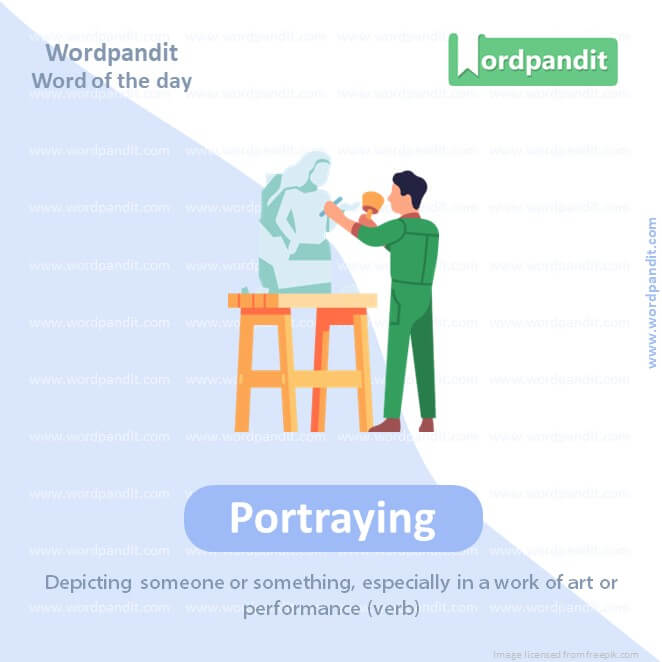
WORD-5: Portraying
CONTEXT: Trump and his allies have provided Biden the opportunity to counter the Trump-Johnson strategy by portraying himself as a proponent of vigorous border enforcement and Trump as a politically motivated politician who doesn’t actually care about the border.
SOURCE: New York Times
EXPLANATORY PARAGRAPH: Imagine you’re pretending to be a pirate for a play. You dress up and act like a pirate so everyone thinks you’re really one. “Portraying” is just like that. It means acting as someone or something else or showing them in a certain way.
MEANING: Depicting someone or something, especially in a work of art or performance (verb).
PRONUNCIATION: por-tray-ing
SYNONYMS: Depicting, Representing, Illustrating, Mimicking, Characterizing
USAGE EXAMPLES:
1. The actor was praised for portraying the character so convincingly.
2. The book does a great job of portraying life in the 18th century.
3. She was accused of portraying the situation inaccurately.
4. The film portrays the hero’s journey with great detail.
WORD-6: Perceived
CONTEXT: to ensure he is perceived as the same moderate who voters picked in 2020, he and his team will have to politely but firmly resist the election-season demands and pressure of the far left and their interest groups.
SOURCE: New York Times
EXPLANATORY PARAGRAPH: Imagine you think you hear a noise in the other room. Even if it’s not clear what it was, you still feel like something made a sound. “Perceived” is when you notice or think something is a certain way, even if you’re not sure or everyone doesn’t see it the same way.
MEANING: To notice something or someone by using sight, sound, touch, taste, or smell.
PRONUNCIATION: per-seevd
SYNONYMS: Noticed, Detected, Observed, Recognized, Understood
USAGE EXAMPLES:
1. She perceived a change in his mood.
2. The risk was perceived to be low.
3. He perceived the comment as an insult.
4. The customers perceived the brand as trustworthy.
WORD-7: Vociferously
CONTEXT: It’s odd, to say the least, that the ethnic group that is today most vociferously accused of settler colonialism is the one that can unmistakably trace its language, culture and religion to the same places from which it was long exiled and now inhabits and governs.
SOURCE: New York Times
EXPLANATORY PARAGRAPH: Imagine someone shouting their favorite song really loudly because they love it so much. That’s being “vociferous.” It means speaking or yelling very loudly and strongly because you have strong feelings about something.
MEANING: In a loud, forceful, or intense manner (adverb).
PRONUNCIATION: vo-sif-er-uh-slee
SYNONYMS: Loudly, Stridently, Boisterously, Clamorously, Energetically
USAGE EXAMPLES:
1. She vociferously opposed the new policy.
2. The crowd cheered vociferously for the team.
3. He vociferously defended his point of view.
4. The proposal was vociferously criticized by opponents.
WORD-8: Coddling
CONTEXT: When we’re formulating policies for children as a whole rather than coddling our own little angels, we fall scandalously short.
SOURCE: New York Times
EXPLANATORY PARAGRAPH: Imagine you have a little chick that you keep warm and safe in your hands, being very gentle with it. That’s like “coddling.” It means taking care of someone or something in a way that’s very protective, sometimes too much, making sure they’re super comfortable and safe.
MEANING: To treat in an overprotective and indulgent way (verb).
PRONUNCIATION: kod-ling
SYNONYMS: Pampering, Babying, Spoiling, Mollifying, Indulging
USAGE EXAMPLES:
1. She was accused of coddling her child too much.
2. The coach believed in tough love rather than coddling his players.
3. Coddling the employees will not improve their performance.
4. He felt that coddling the students would not prepare them for real life.
WORD-9: Unconscionable
CONTEXT: If even Mississippi, with unconscionable child poverty, can focus on reading and significantly raise educational outcomes, then no state has an excuse for letting students fail.
SOURCE: New York Times
EXPLANATORY PARAGRAPH: Imagine someone taking all the toys and not sharing any, even when they see others are sad. That’s being “unconscionable.” It means doing something very unfair or wrong that it just doesn’t seem right at all, almost like there’s no thought for others.
MEANING: Not right or reasonable; unethically excessive (adjective).
PRONUNCIATION: un-kon-shuh-nuh-bul
SYNONYMS: Immoral, Unjust, Excessive, Outrageous, Inexcusable
USAGE EXAMPLES:
1. The price increase was considered unconscionable.
2. It was an unconscionable act of betrayal.
3. The judge found the contract terms to be unconscionable.
4. Charging such high fees for basic necessities is unconscionable.
WORD-10: Congregated
CONTEXT: Malicious anti-Lincoln men congregated near the Capitol. But thanks to Gen. Winfield Scott’s steely defense, the Capitol held.
SOURCE: New York Times
EXPLANATORY PARAGRAPH: Imagine all your friends coming together at your house for a birthday party. Everyone gathering in one place to celebrate is called “congregating.” It means when people or animals come together in a group for a reason or just to be together.
MEANING: To come together in a group or crowd (verb).
PRONUNCIATION: kon-gri-gay-ted
SYNONYMS: Assembled, Gathered, Met, Collected, Rallied
USAGE EXAMPLES:
1. The fans congregated outside the theater to catch a glimpse of the star.
2. Birds congregated at the feeder during winter.
3. The community congregated in the park for the annual fair.
4. Protesters congregated in the city square to voice their demands.
Vocabulary Hard Words
The experience of unraveling the depths of language learning often leads us to ‘vocabulary hard words’. These challenging jargons might seem daunting initially, but with the right learning strategies, the enigma of ‘vocabulary hard words’ can turn into an enticing quest. But how can these ‘vocabulary hard words’ be learned effectively?
Firstly, to master ‘vocabulary hard words’, it’s vital to break down the process into manageable steps. Instead of tackling several words at once, focus on understanding a few each day. This gradual approach ensures effective retention and understanding.
Multimedia resources tremendously aid in comprehending ‘vocabulary hard words’. Movies, podcasts, or even music in the target language contribute a comprehensive perspective. They provide real-life contexts and usages of ‘vocabulary hard words’, making them more understandable and less intimidating.
The incorporation of memory-enhancing techniques, such as flashcards or digital apps, can significantly bolster the retention of ‘vocabulary hard words’. Such tools encourage active recall, helping to cement these words into your long-term memory. Mnemonic devices can also aid in making these words more approachable by associating the hard words with relatable images or stories.
Practice is decisive when learning ‘vocabulary hard words’. Using these words in your conversations, written communications, or even social media posts will facilitate a robust understanding and recall.
Finally, do not worry about making mistakes while using ‘vocabulary hard words’. Mistakes are essential stepping stones in the learning process. They provide insights into areas that need more focus and help refine your grasp over these words.
In conclusion, grasping ‘vocabulary hard words’ is undoubtedly a challenging task but not an insurmountable one. With the aid of effective strategies including graded learning, multimedia resources, memory-enhancing tools, and regular practice, the process of mastering ‘vocabulary hard words’ can become an engaging and rewarding journey.







